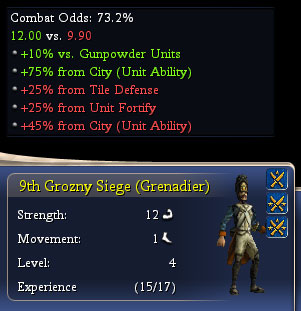Part 23
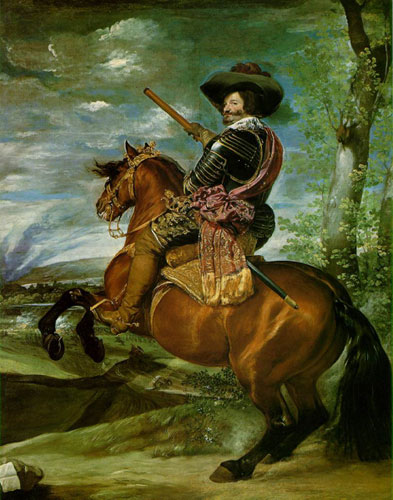
A portrait of Denis Davydov, Russian general-poet and inventor of the genre cannon poetry, a brand of poetry marked for its flexible rhyming, realistic themes, and startling cruelty. Today, he is widely known as the conqueror of Spain.
A Dead Spaniard
To you who'd read my songs of War
And only hear of blood and fame,
I'll say (you've heard it said before)
"War's Hell!" and if you doubt the same,
Today I found in Seville Wood
A certain cure for lust of blood:
Where, propped against a shattered trunk,
In a great mess of things unclean,
Sat a dead Spaniard; he scowled and stunk
With clothes and face a sodden green,
Big-bellied, spectacled, crop-haired,
Dribbling black blood from nose and beard.
-- Denis Davydov
We can't corn the powder, but we have improved the gun.Aside posted:
If some of you have been wiking my quotations and their attributions, you've realized that the vast majority of them are my inventions, a handful of them are proper quotes which I've correctly attributed, and every once in a while, a quote (or paraphrased quote) is a mildly edited quote which I've purposely attributed to a fictional character.
This poem is an example of the third kind. I've hopefully marked every one of this kind with an aside like this one.
This poem is a slightly modified WWI war poem written by the British poet, Robert Graves. The original is entitled "A Dead Boche." A Boche is a German. Go ahead and read the original here and compare.
Another interesting detail: Denis Davydov actually invented hussar poetry, which was hedonistic, flexibly constructed, and bragging.
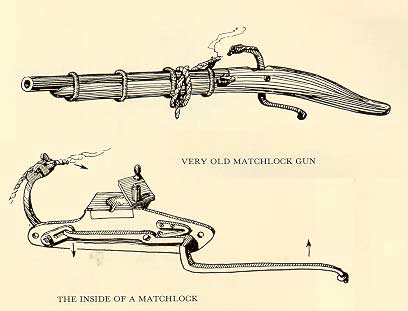
Luis Isaac's primary contribution to Steel Buddhism came too little, too late, but since his various designs would spur on the development of guns, he is placed alongside Archimedes and Gustav Delvigne as one of the three Fathers of Firearms.
Note that Luis Isaac was the first to call his firearm a gun. "Gun" was a phonetic misspelling of gonne, but because of the continued interest in his designs for centuries after the Russo-Spanish war, the name became popular and was eventually adopted throughout the world.
Breech-loading, flash pans, brass cartridges, wheellocks, snaphances, matchlocks, and even flintlock designs can be attributed to Luis Isaac. He dreamed beyond the capabilities of contemporary materials and machines. He would write in the margins of his notes, "If this could be perfectly circular..." or "If there was a metal strong enough..." or various other requirements which had to be fulfilled before his inventions could become real.
In the end, however, he designed only one gunpowder weapon that could be mass-produced by the Spaniards. He called this weapon the musket.
In every way, the musket was an improvement over the gonne.
Gonnes were lit with a hand torch which had to be carried seperately. Muskets used the matchlock firing system. A cotton string was soaked in saltpeter, dried, and lit, forming a match that would burn in dry weather for up to an hour and a half. This match was attached to a hammer-lock, which rested over a flash pan at the back of the gun. You mixed your powder components in a bag, dropped a few ounces in the flash pan, dropped your shot down the barrel, and then aimed at the target. When you wanted to fire, you squeezed the trigger into the stock, the flash pan flipped open, the hammer dropped, and the match set off the powder. The flash pan opened like a reverse cone into the barrel of the gun, directing most of the blast against the back of the bullet.
Unlike the Russian gonne, muskets were lightweight, cheaper to produce, and most importantly, they were more accurate. They fired a lighter shot, which a man could control without setting the weapon against a support. With a little practice, you could hit a man-sized target with every second or third shot, and you could reload and refire in about half the time it took to reload a gonne.
Unfortunately, the musket was completed and produced only five months before General Denis Davydov conquered Madrid and siezed Luis Isaac, his engineers, and his designs. In the actual battle, only a thousand muskets were fielded, and that's only a drop in the sea of soldiers that fought over the Spanish capital. If he'd finished a little faster, maybe the war would have swung another way.
The Story of Sergei Nilus, cntd.
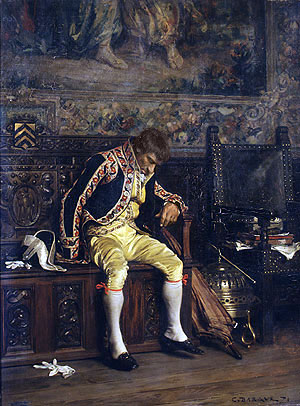
A Spanish painting entitled The World-Weary Russian, believed to be one of the only two images of Sergei Nilus ever produced.
The news of Barcelona's capture literally caught us on the road to Madrid. I asked for any news concerning the Church of the Nativity, and thank God, it was unharmed. The Division General had followed my directions, and the Russians had occupied the city with a minimum of looting and destruction.
All that remained now, of course, was to organize the defense of Madrid, and God help me, our escape plan for when the city fell. Even if we could muster the entire military of Spain, it was hard to imagine that we could fight back against these overwhelming odds. In truth, now that Barcelona had fallen, I could not care as I once did. I wanted to return to the Order and live out the remainder of my days under Russian rule. But alas, I was probably known to them as a traitor, and I knew that I couldn't risk a return.
At least I could use the resources at hand and pray for a miracle. If we defeated the Russians here, then who knew? Maybe we could return to Barcelona.
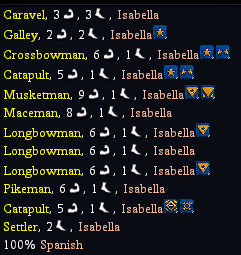
Please, don't think that the Spanish military was weak. Can you imagine what 90,000 men looks like? With Magnain's force of 20,000, with 10,000 soldiers from Barcelona, with 30,000 soldiers from Seville, and with another 30,000 from Madrid, we assembled the largest army yet seen in human history. The Russian forces, though expanding continously as the Empire continued to flex their industrial might, numbered a mere 60,000 by comparison. If all else had been equal, it was hard to imagine how we could lose.
Of course, the reasons we lost are obvious: we were defeated by superior technology and superior tactics. But in the beginning, I found hope that we were reaching parity. While the Russians marched through the countryside, it came to my attention that a Spanish man named Isaac had developed a more advanced gonne, which he called a musket. He had only produced about a thousand of these weapons, we hadn't built any corning sieves, and our supplies of powder were small; but it seemed that with the muskets, we might be able to fight back against the Russian's gonne siege tactics.
I was such a fool. If the Spanish could develop such a weapon in a short time, what prevented the Russians from developing something better?
Drinking With Magnain
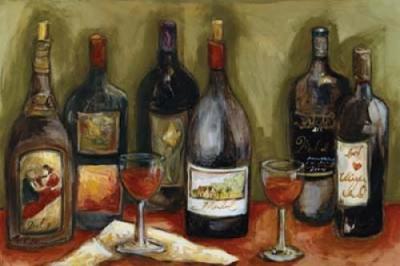
Over the next two months, I trained elite Spanish soldiers in the use of firearms. Dubbed the "musketeers," these soldiers burned through two tons of powder and four tons of iron while under my tutelage. The hours were long--I'd often awake at sunrise to direct the mixing of the day's powder, break for lunch, and then resume training until the dinner bells--but they had to be long. I was attempting to press a year of exercises into the vanishingly short grace period afforded to us by the Russian's ponderous pillaging of the farmlands to the south of the city.
I was motivated by my feverish imagination. I repeatedly dreamt of walking into the Church of the Nativity in the middle of a choir service and waving the Spanish flag while screaming, "The Russians have lost, the Russians have lost; Barcelona is ours!"
I was sustained by General Magnain's indolence. My exhausting schedule could never be kept without periods of rest. I was skipping breakfast, and during many lunches and dinners, I sat with the Division Generals and planned and replanned our defenses of the city. During those meetings, I often left full plates untouched. Thankfully, Magnain insisted that I join him for a drink whenever I could, and he stocked his room with a fair-sized platter of fruits, salads, breads, cheeses and dried meats. After a couple of drinks, my stomach would unwind and open, and hunger would stab through me like a spear stuck in a pig. I would go into a frenzy, eating everything I could force down my throat. Magnain, on the other hand, barely ate a bite.
Finally, one day I ate the entire platter and drank the full bottle of wine, and realized that Magnain had done nothing. He was completely sober. "Christopher--" I omitted the honorifics because I was drunk, "you invite me to drink, but you don't."
He squinted at me. I suddenly realized that his face was haggard. His cheeks were sunken, and his eyes were saddled with loose bags. He looked uglier than ever before, like an aging orangutan from the Chinese jungles. I tossed the platter onto the table between us and started to laugh.
"I haven't eaten in three days," he said. Then he turned his eyes towards a painting on the wall.
"Why not?" I leaned over the table and slapped him on the shoulder. He grunted. "Come on, man, speak to me."
The poor fool looked up at me. "I am incompetent," he said, "and Isabella knows it. She's known it for weeks."
I straightened my spine and swallowed my spittle. My mouth was as dry and crisp as the tone I used when I said, "You aren't incompetent, General Magnain."
Magnain frowned at me like he'd bitten a lemon. He had something to say, but he couldn't say it, so he slammed his fist down on the platter. Because it hung over the edge of the table, his blow passed through it without resistance, his body tilted out of balance, and the platter flipped up over his hand and into the air. He jerked back and caught himself, and the platter slapped him over his right eye.
I was too drunk not to laugh, but my mockery was cut short when I heard Magnain slander Jesus Christ.
I put my elbows on the table and pointed at Magnain like my finger was a dagger. "That was uncalled for," I said.
"Don't lie then," said Magnain. "I know myself better than you think. You run this army, Sergei. You've been running it for a month and Isabella knows it."
I dithered on the possibilities. I could insist that Magnain was competent, even though he wasn't. But I didn't. I simply nodded in soft agreement and said, "So what does it matter? It's your army, Magnain. If we win, the glory is yours, and if we lose, the failure can be mine. It's not that bad, don't you think?"
Magnain's eyes watered. "I need Isabella's respect, Sergei."
And when he began to cry, I was moved with sympathy. "Why?" I prodded, even though I knew the answer. "What does her opinion matter? She wouldn't dare remove you from command."
Between sobs, Magnain told me all about his relationship with Isabella. I convinced him to open another bottle of wine, and after the alcohol loosened his tongue, I learned enough to write his and her personal histories.
Poor Magnain. He wasn't just an incompetent General. He was insecure and in love.
The Fall of Madrid
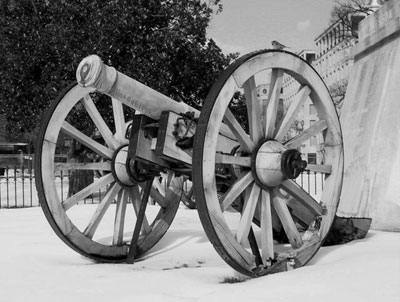
On the first day of battle, the Russians paused far outside the city walls. Our men rushed to the defenses, and using spyglasses, they watched the Russians line up in regiments. We expected for them to move up, because there was no way that a musket, bow, or gonne could cover that range; but they did not advance.
After the Division Generals woke me, I took a spyglass myself, and looked out over their forces. At this distance, I could discern something flat and metal amongst the Russians, a new kind of weapon I hadn't seen. But nothing, I thought to myself, could fire and hit at that range.
I was waving to Magnain and Isabella, who were standing together in the courtyard below the walls, when the men started screaming, "Mire!" I heard a rolling series of thunderous booms, deeper and louder than grenades or gonnes. Even at this range, they hurt my ears. I twisted about on my heels and saw great lances of smoke jutting out from the attacking regiments. I instinctively asked the man beside me, "What is that?" in Russian.
He glanced at me with a confused face, and died.
Let me elaborate. Something hit the masonry beside me and pushed through it in an instant, like the finger of an vengeful God. I flinched, and pieces of whizzing stone cut my face and hands. Still, I hadn't shut my eyes fast enough. For a moment, long enough to etch a single memory, I saw that confused soldier fall to pieces like a rotten fruit smashed underfoot.
I opened my eyes. The granite wall eroded like a sandcastle on the beach. In many places, it was as if the masonry had turned to dust. Men screamed and scrabbled for support against free-falling rocks, and in great bunches, they tumbled into fresh cairns. Something warm dribbled into my right eye, and I closed it.
A woman's throat-straining scream pierced through the commotion. I looked for Isabella and found her pinned under Magnain's collapsed figure. I thought that the General had been killed, but after a moment, he rolled off the Queen, stood up, and shook the stones off his coat. Beside them, I saw a line of corpses: five, maybe six soldiers. Truthfully, one man was still alive, but he would die shortly. His leg had been shattered, and the exposed bone was breathing in the dirt and grass. Beside him lay an iron ball larger than a human skull. It was his leg that terrified the Queen.
Without waiting for permission, Magnain bent and scooped the Queen into his arms like she was a peasant-girl. She might have struggled with the indecency of being carried, but Magnain yelled something, and she seemed to relax. He started to run from the devastation and the panic. Good man, I thought. He knew his job. Later, I heard that he carried her the entire two miles to the palace gates before setting her down.
I called for the soldiers to clear the ramparts immediately. I evacuated to the stairs on my left, away from the loosened stones. Once I'd reached the courtyard, I inspected the iron ball beside the wounded soldier. I thought it was hollow and tried to pick it up, but it was solid and too heavy to be moved without assistance. I was deeply awed. These were the largest bullets ever fired in human history, and their destructive power easily outmatched that of a catapult. Plus, the range, dear Christ, the range.
I still wonder how this is possible. I assumed that gonnes weren't made this large because the charge would cause them to explode; I'll never know how they did it, but the Russians managed to make them anyways.
I would later learn that these large gonnes were called cannons.
I heard another series of thunderous cracks, and in the courtyard, the soldiers began to panic. The masonry was struck again, and more stones fell away from the top of the walls. I issued commands at the tops of my lungs and tried to establish order. Eventually, Spanish training did most of the work for me. Command structures reestablished themselves, comrades found each other, and we reset our regiments along the entire eastern face of the city.
The cannon barrage continued for the afternoon and well into the evening. Men cycled out for rest, and at sunset, we set tables and served food to the soldiers. At this moment, I understood the greatest flaw in Vasnetsovian warfare--though the Russians would have a decisive battle, they would fight our full force at the peak of their fitness. There would be no siege.
But then again, look at the half-broken wall. The Russians believed there was no more need for sieges. In truth, soon enough, there would be no need for walls either, not when the Russians could break them with cannons. Traditional military strategies of assault and defense would soon vanish in a flash of gonnepowder.
At dawn, the barrage resumed. I kept scouts on the walls and through the gates at all times, and by noon we completed a good count of their forces.
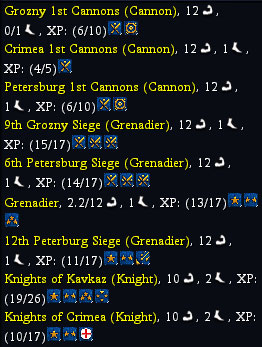
60,000 extremely well-trained and experienced soldiers, carrying vast numbers of gonnepowder weapons, plus three full runs of these cannons. Though our forces outnumbered them with a ratio of 3 to 2, their forces seemed an entire age ahead of ours. When the liberals called this time a Renaissance or Rebirth, they had little idea of how accurate their terminology would become. War was being born again as the walls of Madrid were broken.
By sunset of the second day, our soldiers were exhausted from stress. Unlike the veteran Russians, the green Spaniards had difficulty sleeping under battlefield conditions. Morale was at an all time low by the dawn of the third morning, and the last bombardment would drive many of them to desert.
By now, a half mile of the eastern wall had been reduced to a mound of rubble and granite sand. With only a little difficulty, a man or a horse could easily run over the ruins and into the city. In effect, the wall was reduced to earthworks; it would provide a modicum of defense, but it would not stop the Russians.
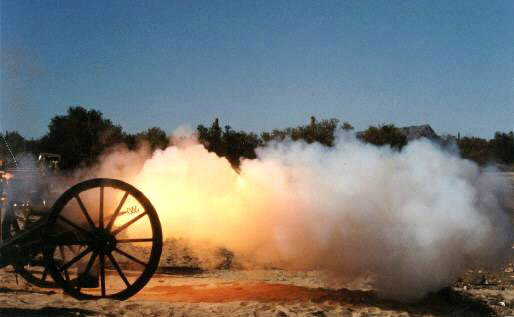
A duplicate cannon is fired in front of a high-speed camera.
The Crimea 1st Cannons and Petersburg 1st Cannons were driven forwards. In the same manner that catapults were sometimes pushed forwards to make the direct firing of grapeshot easier, cannons were pushed forwards to make the direct firing of cannonballs easier. The idea was to roll through a regiment--a ball would hit the lead target, pass through it, bounce, and hit secondary targets. At the bombardment ranges, the ball simply lost too much speed to keep going after the bounce. Hence, the Russians approached our forces and extended themselves.
This wasn't a terrible plan by any means. Davydov expected no resistance from the Spanish longbowmen, and it was beyond his reckoning that we'd be armed with guns.
After the third bombardment began, I personally ordered the musketeers into the breech, and standing in the shadow of the granite rubble, I commanded the firing rhythym. Two lines of men were set along the half mile. The first line would fire on my mark, and then retreat behind the cover of the rubble. Then thirty seconds later, the second line would move up and fire, while the first line reloaded. This rotation led to a new volley every thirty seconds--four times as fast as the Russian gonne-siege method.
Our initial volleys completely disrupted the Russian cannoneers, and for a time there were few or no cannonballs shot. However, the Russians were crafty, and as I would later learn, they began to use their own cannons as temporary cover. They resumed firing over us and into the regiments lined on the Madrid hill, until their casualties mounted too high to continue. Then, in one well-executed retreat, they broke the wheels on their cannons, spiked the torchholes, and ran back to the grenadiers.
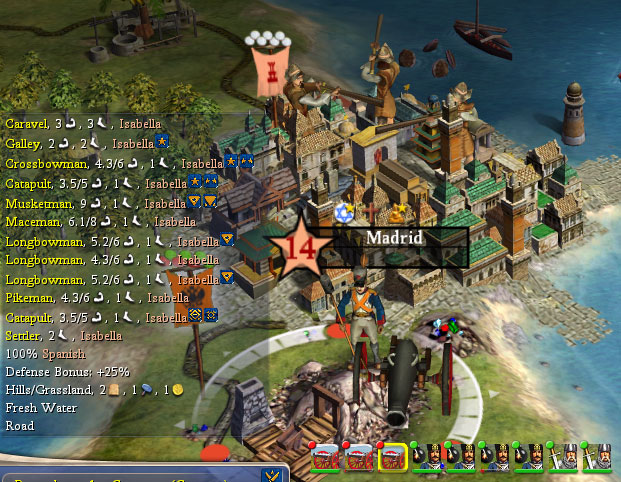
The 9th Grozny Siege advanced towards the breach, stuck supports in the loam beneath Madrid Hill, and began to exchange indirect gonnefire with my muskets. Fortunately, the debris provided us with fair cover, and the number of casualties we sustained was a mere 230 men, while the Russian siegers suffered massive fatalities.Aside posted:
Look at that. Cannons are a fantastic unit. They're strength 12 gunpowder siege weapons, which means that they can fight medieval units, ignore walls, and completely crush an army with collateral damage.
In this case, each cannon had a 22.5% chance to win the fight. The single Spanish musket in Madrid was trained under the Theocracy civic, giving it two free levels. Isabella had chosen two city defense promotions, which made it an extremely tough defender. Nevertheless, I suicidally threw my cannons into the fray. I hoped to weaken the muskets and the longbowmen with collateral damage. Unfortunately, the muskets took NO DAMAGE, while my cannons heavily damaged (20+%) all the other units defending Madrid. Worse, it seemed as if my cannons would be killed... but then a miracle happened.
One special ability of a cannon (and most siege weapons) is the chance to withdraw. In this case, a cannon can withdraw from a fatal blow 25% of the time. Both the Crimea 1st and Petersburg 1st withdrew rather than dying, but their strength was reduced from 12 to 1.4 in the process. Ouch! They'll take a while to heal.
Still, I dealt those bastards a ton of damage. This makes the fighting a lot easier. Especially because the Spaniard's strongest defender is now moved to the top of the stack, and will defend against my best attackers.
Look at this image, and then let me explain. Please note now, Madrid is on a hill, and my cannons have cleared away all cultural defense and wall defense bonuses.
Okay. When a unit has the all 3 city raider promotions, it gains a total of +75% versus defenders in a city and +10% versus gunpowder units. Since muskets were a gunpowder unit, the calculation for musket strength was:
9 (base strength) + 9*.25 (bonus from hill) + 9*.25 (bonus from fortifying for five or more turns) + 9*.45 (bonus from city defender promotions I and II), for a total of 17.55 strength! Wow, that's a lot of defensive power. So much power, in fact, that the musket should be the strongest defender, and should therefore defend against the first unit I attack with.
However, my grenadier's promotions actually reduce the strength of the musketman (which runs counter to the popular belief that city raider causes your unit to do more damage). It reduces the strength of the grenadier by 9*.75 (city raider promotions) + 9*.1 (city raider promotion's bonus versus gunpowder units), or a total of 7.65 strength. Take 17.55 and subtract 7.65, and you end up with the game's final listed strength for the musket, 9.90!
That sucks for the Spaniards. My grenadiers are naturally strength 12, which means that they easily surpass the muskets. Hence, they have a 73% chance of defeating them.
Oddly enough, the calculations ended up a little different when we took into account an *unhurt longbowman.* Longbowmen have a natural +25% defense while in a city and while on a hill. So the strength calculation for Madrid's most experienced longbowman is 6 (base strength) + 6*.25 (natural city defense) + 6*.25 (natural hill defense) + 6*.25 (fortified for five or more turns) + 6*.20 (city defender promotion I), for a total of 10.95. The reduction from the grenadier is 6*.75 only, because longbowmen are not gunpowder units. This leaves the longbowman with a total of 6.45 strength. You might think to yourself, "Zooloo, that's obviously worse than the musket, so why are you telling me all this crap?"
The answer is simple: longbowmen, unlike muskets, have a natural first strike bonus. They get 1 round of free blows versus any opponent without first strikes, which tips their unwritten game strength to something around 60% more effective. Don't believe that this makes a first strike the best upgrade--the longbowman is far more likely to lose the battle than the musketeer. However, the game judges that the longbowman is far more likely to do more damage to my grenadier, and hence makes a better defender than the muskets.
Essentially, the game refused to let my grenadier attack the muskets until all three of the equally wussy longbowmen were dead or weakened. I considered this unacceptable, so I sent in my first cannon on the hope that I could either: A. Cripple the muskets and make my knights viable; or B. Cripple the longbowmen so that the muskets become the first defender. In this case, it took two tries, and by some serious gambler's fortune, all the longbowmen were weakened and the musket became the primary defender. Now I can eliminate it, and everything that remains in the city will be reduced to mincemeat by both knights and grenadiers alike, since the only major threat to my knights were the Cthulhu-damned muskets! Hooray!
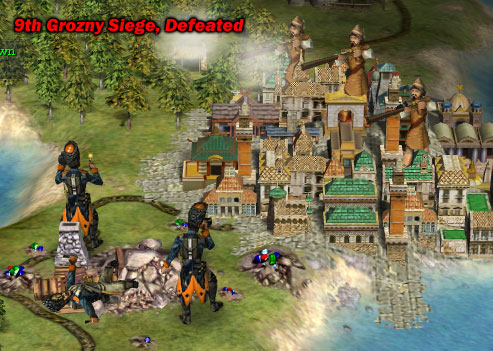
However, Denis Davydov did not sacrifice a unit without purpose. Though the 9th Grozny was nearly annihilated in the process, the 12th Petersburg grenadiers marched forward under their covering fire to within a hundred feet of our defenses, and using shortgonnes and numbers, they suppressed our musketeers long enough to lob hand grenades into our lines.
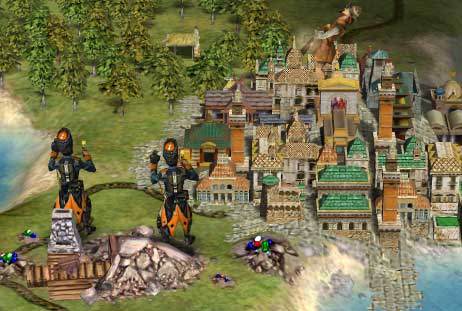
There are few things as terrifying as sudden explosions. When the first grenade came tumbling over the rubble, I cried out for the men to scatter and retreat--but the Russians were master cookers. It exploded instantly, cutting down five or six men and wounding several others. And then, up and down the entire half mile, I could hear the hammer-blasts of grenades detonating. I was one of the lucky few--in that initial volley, almost all the musketeers were wounded. A couple dozen of men independently decided to retreat, but the rest were either dead, crippled, or collapsed and dazed--and then the 12th Petersburg came charging over the walls with sabers in hand. They cut down anyone who did not flee, and picked at the remaining runners with shortgonnes.
In the manner of true Vasnetsovian warfare, the Russians had attacked our strongest point and crushed it. I heaved my way into a group of longbowmen and commanded them to string arrows. I turned to look back at the Russians, and in a great wave, I saw them pour through the half-mile gap. Ten thousand densely packed troops arrived in seconds. I could see the standard of the 6th Petersburg flying from the rubble--an image of a giant Ilya Muromets holding a fiery sword, stepping over a wall, and eclipsing the sun.
As the 6th Peterburg approached, the longbowmen fired--but in return, they were struck by gonnes and hand grenades, and in a matter of minutes, they were broken or dead.
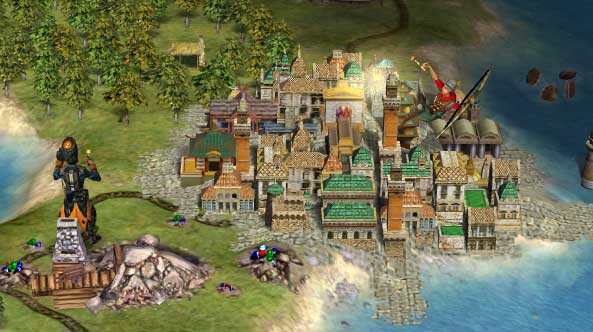
I continued to retreat up the battlefield. Flaggers position on roofs on the hillside began to coordinate intelligence. As the Russians poured through the gaps, the Division Generals exchanged information and prepared defensive strongpoints along the flanks, so that the Russians could not envelope us in a thin but deadly line of gunpowder soldiers. In the center, near the breach, almost 10,000 longbowmen assembled and began to rain arrows down on the Russians. Even with shields, the sheer number of arrows was enough to kill many attackers.
Where we organized our strength, that's where Davydov brought his power to bear. The Grozny 1st, his last cannon group, opened fire on the longbowmen. Though several of the rounds fell short and killed Russians with friendly fire, most of the cannonballs flew overhead and wreaked havoc amongst our regiments. In the ensuing disorder, an entire brigade was lost, and many hundreds immediately took to deserting my forces and dispersing back into the city.Aside posted:
At this point, I waited another turn before continuing the assault. This explains why I used some units twice.
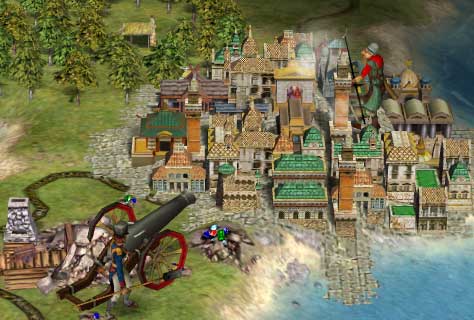
Russian cannons destroy Spanish longbowmen.
I don't blame the deserters. The din of regular combat was famously defeaning, but the cracks of thunder, the gouts of flame, the fog of war that arose from ignited powder--it was more than some could stand. Many of the men saw firearm-based warfare as a manifestation of hell, and unnerved, they defecated in their armor and ran from the battlefield.
Furthermore, even though our numbers were greater, our scale was hidden by the curve of the hillside, and so for each man, it looked like we were outnumbered by the crawling mass of Russians who siphoned through our shattered defenses.
Pulling up the rear of the Russian forces were General Davydov and the Knights of Crimea, Novgorod, and Kavkaz. Immediately, the calvary horde divided in twain and rode off towards the flanks of the battlefield, where our slower, better armed units were trying to close off the gaps and form a rigid line to encapsulate the Russians. The plan was simple: if the Russians were caught like pus under a blister, they could not bring all their weaponry to battle at once, and our superior numbers would inevitably wear them down. However, if the Russians broke through at any end, then they could spread out and utilize all their resources to full effect.
Unfortunately, Davydov was a master tactician. With the Knights of Crimea under his command, he rode along the face of our forces until he sighted a weakpoint in our defenses, a mill road defended by a mere thousand pikemen in a wide line. He drove an assault up this road, and though the pikemen had all the advantages--support from the flanks, superior weapons, and the high ground--the Russians smoothly bloomed into a wide wedge and then recollapsed on the north flank of the pikemen as panicked Spanish soldiers pulled back from the warhorses. Once they flanked the pikemen, the Russians pushed into their side and rolled them up like a blanket. They were routed and cut down, and an entire road was secured. Thousands of knights were now behind or flanking our lines.
Over the course of the next hour, hundreds of our units were routed or destroyed.
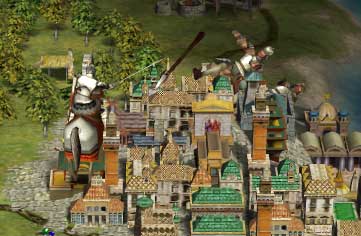
The foul expatriate's plans could not hold back the Russian knights.
A similar tragedy occured on the south flank. The Knights of Novgorod found a poor opponent in our men. The macemen had deployed too close to the wall, and outside of longbow range, they were attacked and butchered by the Knights. The flank quickly disintegrated.
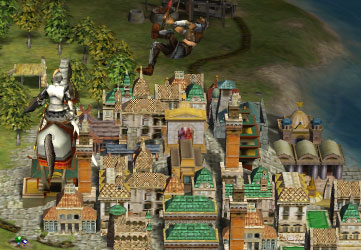
With both flanks captured, the knights began to carry the weight of the battle. They moved in a massive pincer movement, creating confusion amongst the Spaniards. Confronted by enemies from both the front and the sides, they were easily broken and routed. Many of our soldiers made for the central strongpoint, only to come under fire of longgonnes and cannons. Our forces dwindled, and more enemy firepower was concentrated on fewer and fewer defenders.
We were doomed. When I saw the Russian grenadiers packing up their longgonnes and advancing with sabers, I understood that we were nearly surrounded and ready to be annihilated. I looked behind me, up the hill at the palace. If I escaped, there would still be hope, however small and dim. But if I waited, if I did the honorable thing and fought beside my bravest soldiers, I would be captured or killed.
The decision was pathetically easy. For the sake of Barcelona, I joined many of our bleeding men and ran towards the city of Madrid. Behind me, the final battle played out with grim efficiency.
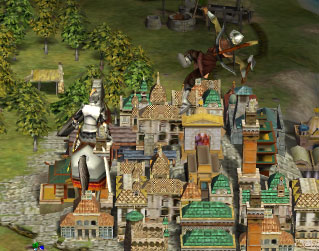
The Knights of Kavkaz rode up behind me and finished encircling the Spanish defenders. The remainder mostly consisted of longbowmen and crossbowmen, but they were out of bolts and arrows. I imagine some of them tried to surrender, but that would do nothing--the Russians would slay them to avenge the dead. As for the rest, the true fighters--they probably drew their handweapons and met the Russians glorious combat. If Steel Buddhism is the true path to God, then they went to Amitabha with a Steel Sword in their hands.
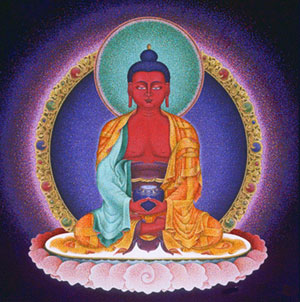
I returned to the palace, only to find myself blocked entrance by a guard who refused to recognize me. I asked him to call for his captain, but he blindly refused, having been told by Magnain himself that "Nobody shall enter until I have left."
I understood exactly what was about to happen. I refused to be discarded so easily. I waited outside the palace well into the evening, when I saw the fires starting in the outer districts of the city. The Russians were going to pillage on a moonless night, even if it required a little destruction.
Finally, at sunset, a carriage emerged from the palace gates. I suppose what I did was incredibly risky, but at the time, I didn't give it a second thought. I stepped into the road and yelled out, "General Magnain!" at the top of my lungs. Surprisingly, the General must have heard, because the carriage pulled to a stop and the door opened.
"Teniente-General!" said Magnain, "You are alive!" Beside him I saw the Queen with an apprehensive expression.
"I am alive." Without asking permission, I stepped onto the running-rail and into the carriage. Magnain and Isabella were seated across from their luggage. I grabbed an ornate box presumably packed with expensive clothes and tossed it out of the door to make room.
Isabella frowned, but she did not speak.
Magnain said, "I heard that your unit of muskets had been slain to the man."
"A rumor." I crossed my arms and sat down. "Let's go to Seville," I said.
After that, words were abandoned. I withdrew the curtain on my door, and watched the darkness of night engulf the Spanish capital. I hoped that between now and dawn, the atrocities would be completed and forgotten. What is born in darkness, hopefully remained in darkness.
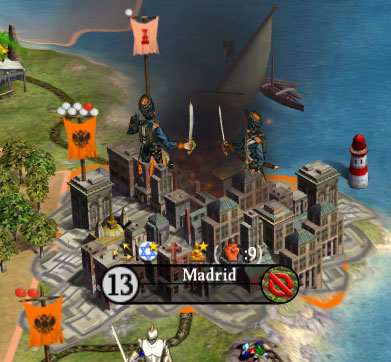
Madrid had fallen.
The Problem with Seville
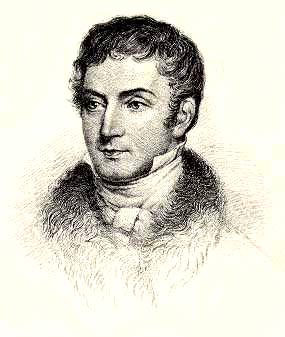
Irving van Buren, the German diplomat to Seville.
Seville was a large and cultured city, but it was always centered in a calm and pastoral province. It's production capabilities were abysmal, and even with the broadest recruitment guidelines, we could hardly collect more than a dozen thousand longbowmen for its defense.
Isabella and Magnain were depressed. They would sit together for hours and literally do nothing. Isabella would stare out a window and Magnain would stare at her. They were without hope; and one had only to look at them to see what troubled them. Isabella's military was not the best in the world. It was soundly defeated, and because of her, now the Spanish Empire was dissolving. Magnain, on the other hand, was merely distraught becaue Isabella hardly acknowledged him.
They were pathetic. Isabella had no imagination, and Magnain had no esteem. Until Russia conquers the world (which will never happen), there are other nations who can raise armies and fight. If Seville was to remain free, if we were going to save Spain, then we only needed to find an ally.
A month after we had arrived in Seville, I met with the German diplomat Irving van Buren, nephew of the reigning Kaiser. I laid down the facts: a Russian military consisting of 80,000 elite troops was marching along the north coast of the Red Sea and would reach Seville in six or seven months. Even at our best, we could hardly field an army one-fifth as large as the Russians, and none of our soldiers would have enough training to adequately defend the city. I'd already contacted Egypt, and they had rejected our offer to annex Seville to their nation--the border they shared with Russia was too wide, and they couldn't risk angering the Russian Empire. The only nation I could turn to, then, was Germany. I offered to give the Germans Seville, if they would garrison it against the Russian forces.
Irving didn't hesitate. Seville was closer to the German city of Frankfurt than the conquered city of Madrid. He accepted my offer, and a deal was struck. He would return to Germany and raise a small army of troops, which he would bring to Seville to "conquer" the city. Since I hadn't acquired the permission of Magnain or Isabella, I agreed to surrender upon their arrival, thereby annexing Seville to Germany without officially declaring an alliance with the Germans. The Russians would not be eager to fight a nation on the far side of the recently conquered Spain, and would likely retreat rather than fight the Germans for Seville. In a lesser form, Spain would survive.
The last thing Irving did before leaving the city was declare war on the Spanish Empire.
Isabella and Magnain were horrified by Germany's sudden "aggression." I hadn't thought their depression could deepen, but it did. They retreated to their bedroom for two days, and they would not eat or drink. Finally, because I was afraid that they had committed suicide, I forced my way into their room and illuminated it with a lantern. Both the Queen and the General were naked and sunk into their feather matress. They were not touching each other.Aside posted:
By the way, Germany didn't actually declare war on Spain in the game.
I called out to them, but they did not respond. I surmised that they were catatonic, and I called upon a doctor to inspect them. Ultimately, they were roused by vapors and given water and food.
I had a talk with them. I told them that against two such nations, our only options were surrender--either to Russia, or to Germany. I left the choice to them. They both chose Germany without hesitation. After that, they seemed to recover, and I saw them wandering around the hotel in which we stayed. Isabella dressed simpler now, and Magnain stopped wearing his medals and military honorifics. All that remained was the wait. In five months, Germany would arrive, and two months after that, the Russians would discover that Seville had been taken.
The plan was not foolproof, however, and improper egos can always find a new path to disaster.
I would later learn that General Davydov reduced his forces by a third and rushed towards Seville with a single siege unit, a single cannon unit, and a single unit of knights. Travelling in smaller numbers allowed him to break off the supply chain and feed his men with pillaged grain. In effect, he cut three months off of the march, because he was determined to reach Seville first.
On November 30th, 1482, I awoke to the sound of a fire bell. I looked out my window and saw a red glow on the Eastern horizon. I thought I saw the dawn, but when I turned to the mechanical clock on the wall, I realized that the hour was barely past midnight.
Seville really was on fire. I leapt out of bed and quickly dressed myself in my military garb. I assumed, on the moment, that a peasant's fire had blazed a little too high and set the thatches on fire in the hinterlands. When I stepped out of the room and onto my balcony, however, I was approached by something altogether worse. The entire craftsmen district was ablaze, and even at a distance of half a mile, I could feel the heat curling my eyelashes.
Then I heard the snaps, like Chinese firecrackers. Gonnes.
I doubted it, at first. I even denied it. The Russians were months away, and my scouts were reporting the same steady march out of Madrid. But the noises insisted on a different story. Gunshots, grenades, the distant hollers of men.
Then I saw them riding around the corner of the street and coming at the hotel. Russian knights on foam-flecked horses driven mad by the blaze. A standard bearer rode at their head. The face of Ilya Muromets looked demonic by the firelight.
I ran back into the hotel and made my way to the stairs. I had to reach their room, I had to find Magnain and Isabella. I didn't know how, but I knew this was their fault. This entire war had been their fault. They were monsters, fools, idiots, deviants. If I could give them to the Russians, then maybe I would be forgiven, then maybe I could go home to Barcelona.
I burst into their room and found them packing silk dresses into sacks. Magnain looked up at me and said, "It's the Russians."
I stepped across the room and grabbed him by the wrist. "What did you do?" I said.
"I don't understand."
I squeezed his wrist, hard. His eyes widened.
"What did you do!"
He tried to twist his arm away from my hands. "I didn't do anything!" he squealed.
"Liar!" I began to rotate his wrist until I could feel his ligaments stretching. He let out a wail, and it grew louder and louder until I could feel a snap. Then he screamed, and Isabella hit me as hard as she could with a sack full of clothes.
"He didn't do anything!" There were tears dribbling out of her eyes. She raised the sack and tried to hit me again, but I just pushed it aside and grabbed her by the throat.
"How do you know?" I muttered. I pushed my fingers into her jugular and started to squeeze. In a few seconds, I could see the effects of my blood choke. She was instantly pale, and purple. Her veins leapt out on her face. Her soft lips dribbled as she approached unconsciousness.
But then I felt a little humanity. She was harmless. She was scratching at my arms, but she hadn't the strength to even break my skin. She was a pathetic little girl, and for a moment, I lost the will to kill. I let her go.
She tumbled to the floor and banged her head against the wood. She was limp. I suddenly felt like I was going to cry. I needed a moment to think, just a second of reprieve to collect myself.
When that thought ended, Magnain hit me in the back of the skull. My vision fuzzed out like the snow in Bangalore. I lurched forward and cracked my nose against the wall. I was suddenly swimming in a familiar sea of pain, a place I hadn't been since I'd sparred back in the Russian barracks. I turned around and faced in the direction in which I believed Magnain stood.
"Don't touch her!" His voice was guttural, desperate, pained: the voice of a empassioned killer. So be it, Magnain.
I didn't think about what I was doing. I simply reacted like a military man--no, like a well-trained Russian. I reached for my belt and pulled my dagger. My vision was filled with patterns and my balance was shot, but I threw myself into the void in front of me because I wanted to live, and in one swift motion, I felt my fist impact into the softness of Magnain's stomach. I dug the knife into his pliant flesh, drew my blade to the left, and cut him straight across the abdomen until I dinged on a rib. Then I removed the blade and pushed the gurgling general away from me.
My vision cleared enough to see, though my periphery was still filled with dancing dots and lines. The front of my shirt was soaking in my blood. My knife had hooked a bit of gristle when I'd pulled it out of Magnain. I turned and wiped it across my pants. The General was dead, or at least unconscious, and fatally wounded. He stared up at the ceiling with one facial expression, the recognition of pain.
Isabella suddenly made a sound. She coughed, like she had gasped and vomited at once. She was staring at Magnain, and holding herself tightly.
"He didn't do anything," she whispered to me, as if finding my forgiveness would convince me to take back my kill.
"How do you know," I said. I kneeled down in front of her and played with the point of my knife. "The Russians are here because of him." I didn't know this, but I wanted to see how she would react.
"No!" She shook her head. "No, no, no."
"Then what?"
"They're here because I sent them a letter."
I tightened my grip around the handle of my dagger. "What do you mean?"
"I told Davydov that we were surrendering to Germany," she said.
My hand started shaking. Isabella, I thought, a war was fought because of you, thousands of young men were slain because of you, I killed an innocent Magnain because of you, and now you've betrayed our plans to our enemy.
"Why?" I asked. I had to know. Everything hinged on this.
"Because I wanted him to know," she said, "I wanted to spite Davydov."
Spite. She had brought the Russians down on Seville and ruined our chances for a peaceful resolution because she was too impatient to wait and spite him after our plans were completed.
I hope Jesus understands why I cut her throat.
The End of Continental Spain
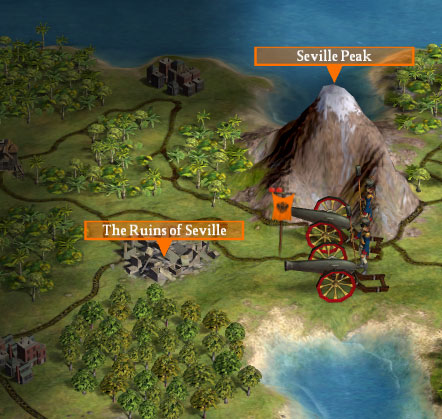
I did some awful things the night that Seville burned. When the Russians captured me, I led them to the corpses of Magnain and Isabella. Then I sat outside the burning city with Davydov and told him everything I thought was important, though I kept some secrets to myself.
In return, he told me about his conquest of the city. They had come at night, swept into the barracks of the soldiers, and slaughtered them wholesale. Then they had entered the city and begun to raze it. Davydov explained it best:
Afterwards, I was taken back to the Russian empire and imprisoned.quote:
Seville is so close to Germany that there is no way I could occupy the city and keep it from them. So, rather than freely give Seville away, I decided to burn it to the ground. Then there would be no conflict between Russia and Germany, because there would be nothing left to fight over. That's Russian diplomacy.
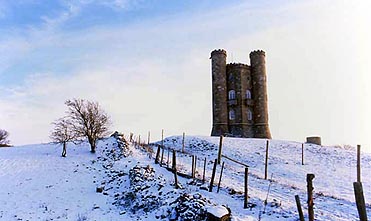
The Bangalore Ice Prison still stands today.
I've been in Bangalore for 1,122 days. My guards are kind to me. I've been offered hundreds of suicide knives, and I'm constantly supplied with paper and ink. The food is terribly unhealthy, and will be the death of me, but at least I'm allowed a blanket and a bed.
This morning, the historian returned to my cell. I've told him a lot of things about the Russo-Spanish war, but today, he wants to talk about Queen Isabella. I've tried to turn the conversation around.
"I killed her," I said.
He didn't look shocked or surprised.
"Did you hear me? I killed the Spanish Queen."
"I know," said the historian. He repeated his last question.
I ignored him and pressed my point. "The Russian soldiers had it all wrong. I checked her corpse, just to be certain. General Magnain didn't lie to me, not even while he was drunk."
This got the historian's attention. He set his pen and his paper on his lap and said, "Explain."
I leaned forward and smiled. What a secret I'd kept all along. "The story isn't true. The Jews were burned, just like the Russians think, but I was the one who burned them. It's all apocryphal, do you understand? Isabella never did any of those things written in the pamphlets. She deserved to die, but she wasn't a deviant or a monster. I was wrong to call her those things."
"I see." The historian picked up his pen and paper. "Tell me, how do you know this? How can you be certain?"
I rapped my hands on the edge of my cot. I would shock this man; I would shatter his preconceptions. "Because, Isabella died a virgin. Magnain couldn't convince her to open her legs, not ever. He told me all about it! Don't you see? The Russians went to war because of a lie!" I started giggling.
The historian dropped his paper onto in his lap. "I know," he said.
What? I stopped laughing.
He stared at me. Smug.
"What did you just say?" I said.
"I know," repeated the historian. "I wrote the propaganda piece that started the war."
"Oh," I said.
I wish I knew the name of the historian. I'll have to ask St. Peter when I arrive in heaven. Otherwise, I'll have no way to make sure that he ends up in hell.
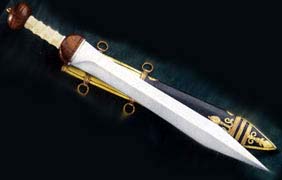
The guards brought me another suicide knife. I unsheathed the blade and laughed.
It's my knife, Magnain.
So far...
Whew. That's the end of the Russo-Spanish war. However, that is not the end of the Spanish civilization. In some of the upcoming peaceful updates, you will come to understand.
